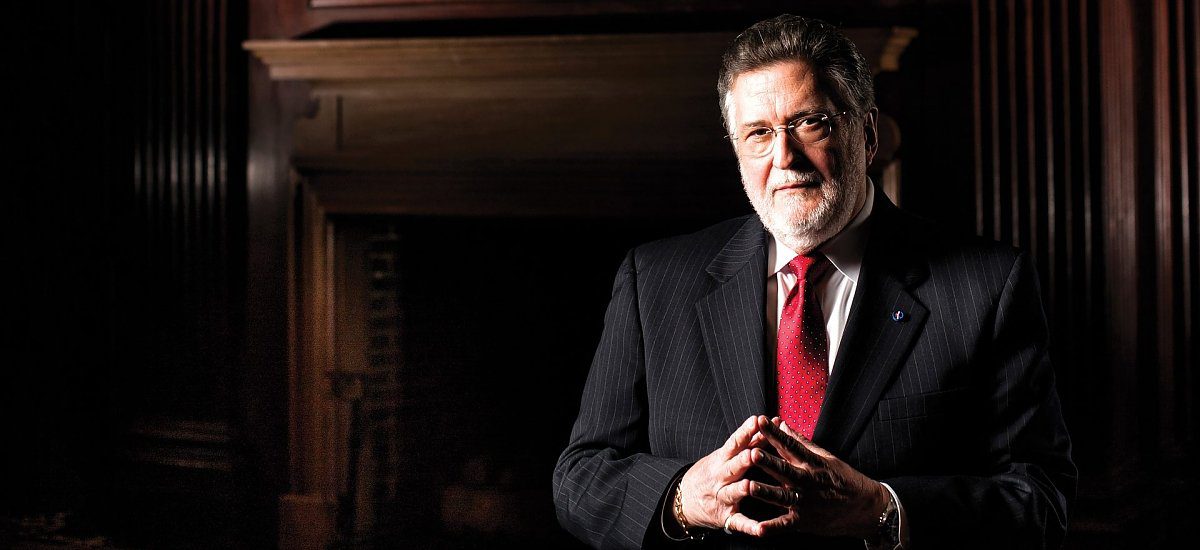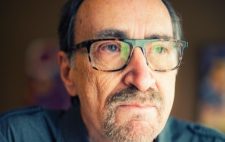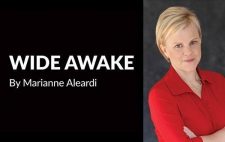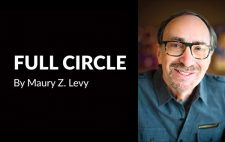Once a month, on a Thursday, the men of the justice league meet for lunch. They are former criminal experts, legends of their fields who have cracked some of the most notable crimes in American history. They meet to review, dissect – and solve – the unsolvable cases from years past.
Photography By David Michael Howarth
They are each super heroes in their own right: 100-plus investigators, federal agents, criminal profilers, medical examiners and forensic pathologists – the best in their fields – and the people responsible for the capture of the world’s most high-profile psychopaths.
This is the Vidocq Society, named for Eugene Francois Vidocq, the 19th-century Frenchman known as the world’s first detective. It is one of the most exclusive clubs in the world, and its members serve a single, demanding mistress: the truth.
Police departments come from all over the country, and sometimes the globe, to exhibit their unsolved cases at the society’s luncheons in Philadelphia, presenting evidence in hopes of getting input and insight from the remarkable membership.
The society sees one case per month, always a murder, and always an investigation that has gone cold, forgotten by the media and most others. But there are those who can’t forget: The frustrated investigators who come to the Vidocq Society for help and the victims’ families, haunted by questions without answers.
Society founder and commissioner Bill Fleisher, a cheerful man now in his early 70s, is a scholar of history, obsessed with finding the truth behind even the oldest of crimes.
“I’m fascinated with biblical times, and the story of Christ, even though I’m Jewish,” says Fleisher, who lives in Cherry Hill. “It would be nice to go back and study firsthand accounts and look into the murder of Christ as a detective. Death is the one mystery we all know nothing about, the one thing that directly concerns us the most. People have been fascinated by the subject of death and murder and homicide, from Cain and Abel until today. We’ve never lost that fascination with it, in literature and art and storytelling. Humans are very curious creatures.”
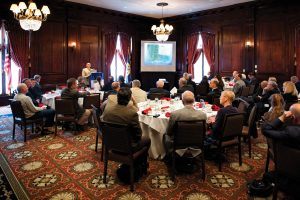
Detectives from Andover, Mass. present a cold case at the society’s monthly meeting
In the late 1980s, Fleisher, then the deputy special agent in charge of U.S. Customs in three states, began having regular lunches with colleagues in law enforcement, where the conversation would inevitably turn to famous cold cases: the Black Dahlia, the Zodiac Killer, Jack the Ripper.
“It started as just getting people together and kicking around old cases, having fun,” Fleisher says.
“It could really be anything, a five-year-old case, a 100-year-old case. We worked on one from the 15th century. Then my friend was asked to go speak at a convention for parents of murdered children in Texas. At the time they had a national membership of like 45,000 people who were related to murder victims with unsolved cases. He said when his talk was over at least 100 people came up to him to ask for help. He said, ‘Bill, there were 3,000 people in that room who needed answers. We ought to start focusing on cases where we can help people.’ So that’s what we did.”
Fleisher is a former Philadelphia beat cop and FBI special agent, an expert in organized crime and a world-class polygraph examiner and interrogator. His co-founders were Richard Walter, a renowned crime-scene analyst and one of the creators of modern criminal profiling, and the late sculptor Frank Bender, a pioneer in postmortem facial reconstruction and arguably the most famous forensic artist ever. In 1990, Fleisher assembled the first official members of the Vidocq Society, each with credentials more impressive than the last.
Today, there are 82 full members – one for each year of Eugene Francois Vidocq’s life – and several dozen more “special members.” They come from law enforcement agencies in 12 countries, including the FBI, CIA, NYPD, Interpol, Scotland Yard, Hong Kong Police, Brigade de la Surete, Egyptian Army and U.S. Secret Service.
Ever the history buff, Fleisher named the society for Vidocq, the consummate bad guy-turned-good and his personal idol, who personifies Fleisher’s deepest beliefs.
“He was a raconteur and a womanizer, and he served time in prison,” Fleisher says. “Then he became this great investigator with a deep understanding of criminals. Vidocq resonated with me so much, because I was a bad kid. I look at myself, and I see somebody who easily could’ve become a mobster, a bookie. I chose the right path, and I was grateful I was given the opportunity to change my life.”
“I love redemption,” Fleisher continues. “I believe in redemption. I offer my hand to anybody who wants to redeem themselves. One of the things that’s required to have redemption is to pay your penance. Not redemption because you got caught. The mob guy who gets absolved by the priest on his deathbed after he’s killed like 35 people? That, to me, is not redemption. For everything there’s an opposite. Where there’s good, there’s bad. I also believe it’s true that a leopard can’t change his spots; but a person can. In my career I have helped redeem people.”
According to Fleisher, Vidocq, a contemporary and friend to writer Victor Hugo, served as the inspiration for the central characters of Hugo’s “Les Miserables,” Javert and Jean Valjean. “Two sides,” Fleisher says, “of the same coin.”
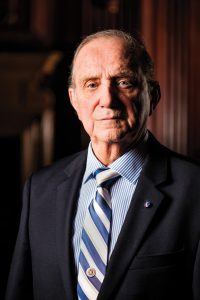
Ben Redmond says some unsolved cases stay with you
Ben Redmond, former Philadelphia inspector general and chairman of the Vidocq board of directors, handles the society’s brass tacks. He and Fleisher are a study in opposites: Redmond is a thin, serious man of uncommon intelligence, who drinks decaf and chooses his words carefully. He is the perfect foil to the stocky, animated Fleisher, a man with a penchant for pinky rings, monogrammed shirts and stand-up comedy.
Redmond says a juxtaposition of opinions, experience and personalities is the Vidocq Society’s greatest strength.
“We recruit the best people from different disciplines,” Redmond says. “On the board of directors alone there are three attorneys, including a former assistant U.S. attorney and a former assistant district attorney, seven former federal agents, one chief of detectives, one detective of major crimes, a DNA expert, a profiler, a polygraph expert. When you’re trying to help solve a case, you have all of this at your disposal. Everybody’s got an ego. Everybody’s got an opinion. The beauty is when you meld it all together.”
Collectively, the assembled membership has centuries of crime-solving experience. “The New York Times” once called them “the heirs of Holmes,” a theme Fleisher has embraced, hosting the society’s luncheons at Philadelphia’s Union League, a Renaissance-style building steeped in history.
“You can feel the brainpower in the room. It’s palpable,” he says. “The ambiance helps – the walnut paneling, the chandeliers, the books. It all has a Holmesian, old-English club feeling. We’re not a secret society – there’s no secret handshake – but we like that ambiance, the history, the mystery. It adds to the energy in the room. It’s a part of the formula.”
The formula, it appears, is working. Over 25 years, the society has heard hundreds of cold cases, providing assistance that has led to breakthroughs in nearly all of them.
“People ask, ‘How many cases have you solved?’” Fleisher says, “and I say about 80 percent. But solving it means nothing. Proving it in a court of law is something different. Most of the cases we see, we have it pretty much figured out who the subject is or at least a good profile of the person who is likely to have done it. The magic is no magic at all. It’s pure experience, open-mindedness and a willingness to listen to the facts and throw out theories. It triggers something, a new thought, something they didn’t think of before.”
The society has had a hand in solving some of the country’s most highly publicized cold cases and apprehending the most infamous fugitives.
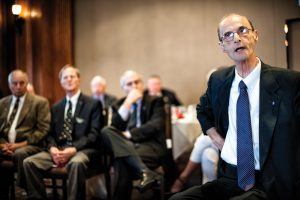
Co-founder Richard Walter discusses an old case
“Sometimes we get recognized for the work we do, sometimes we don’t, and that’s fine,” Fleisher says. “I can tell you a couple homicide cases I was integral in solving, I never even got a thank you. But I don’t care. I know what we contributed to the case. We’re not looking for glory. Virtue is its own reward.”
Not every case, however, has a happy ending. Some cold cases stay cold, despite the society’s best efforts. These are the cases that stick with a person, Fleisher says, the ones you just can’t let go. One of those is the 1984 murder of Edward Bauer, shot to death in his Merchantville auto repair shop. It remains the town’s only unsolved homicide.
“It’s endlessly frustrating,” Fleisher says. “That case is solvable. I think we know who did it, but that means somebody needs to go do something about it, and I’m not sure that will ever happen.”
For Redmond, it’s the brutal, ritualistic killing of a young woman in New York City more than two decades ago.
“It was an old Italian family, and their only daughter had been brutally murdered,” Redmond says. “Her body was left in an area where there was a lot of drug dealing, so of course the first thing you think is it was somehow drug-related. Well, the family never believed that, and neither did I. Her body was dumped there. There were suspects, but they were never charged. For years, the family would write me letters. Her mother would call me up, and it just broke my heart. That one has never really left me. I still have the case files.”
Redmond works to ensure every police department interested in getting help from the Vidocq Society gets that opportunity. The society is a 501(c)(3), and the work they do is exclusively pro-bono. The society pays to fly each month’s presenters to Philadelphia and covers all expenses during their stay. Redmond organizes seminars, like one last year in Phoenix, AZ, where Vidocq members provide help to investigators who can’t make it to Philadelphia. The money, he says, comes from membership dues, donations and option fees from a 2010 book and several movie and television deals.
Despite the outreach, the book (“The Murder Room,” by bestselling author Michael Capuzzo) and the sporadic media coverage over the past 25 years, Redmond says many of those who would benefit most from the society’s help don’t even realize it’s an option.
“We think we’re contributing, doing something positive,” Redmond says. “These detectives come in every month and they’re committed, they’re frustrated, they’re dedicated to what they’re doing. A few months ago we had a detective come in to make a presentation about the murder of an 8-year-old girl. Now that just goes right through you, and you say to yourself, ‘How could somebody commit this horrendous crime?’ You want to help this person solve this crime. You have the ability to help them, and you feel a tremendous responsibility to do so. In many cases, it happened so long ago, we didn’t have the technology to solve it. We didn’t have DNA experts and blood spatter experts. Well, we do now. The message should get out there to police departments small, medium and large, in South Jersey and beyond, that you do have this resource available to you.”
Though new experts are occasionally accepted into Vidocq’s ranks (potential members must be sponsored by a current member and approved by the board), the society’s leadership is aging. Notable members have begun to slip away, including Frank Bender and Philadelphia forensic dentist Haskell Askin, whose testimony in a 1994 murder case resulted in the passage of Megan’s Law, both in 2011; and FBI profiler Robert Ressler, who faced down John Wayne Gacy, Ted Bundy and Jeffrey Dahmer and coined the term “serial killer,” in 2013.
Fleisher, though, is confident the Vidocq Society’s legacy will live on. There will always be evil in the world, he says, but he has no doubt it will be tempered by good. The society’s motto is “Veritas Veritatum” – truth is truth. And the truth, Fleisher says, always comes out eventually.
“It’s awful tough to get away with murder. It’s not something I’d ever want to have to try to do,” he says. “There will always be people who remember, who want answers. There are groups popping up all over the country starting to do what we’re doing, and I think that’s great. There’s always room in town for another doctor; we’ve got plenty of patients.”

